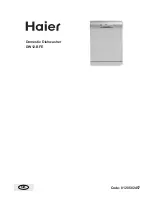
GB -8-
What to do if...
If, after carrying out the above checks, the fault persists, disconnect the mains plug and turn off the water tap.
Contact the After-sales Service (see warranty).
Before contacting our After-Sales Service, take note of the following:
- the description of the fault,
- the appliance type and model,
- the service code (the number indicated on the adhesive rating plate) inside the door on the right-hand side:
Precautions and general recommendations
1. Packing
The packaging materials are 100% recyclable and marked with the recycling symbol
.
2. Removing the packaging and inspecting the contents
After unpacking, make sure that the dishwasher is undamaged and that the door closes correctly. If in doubt,
contact a qualified technician or your local retailer.
3. Before using the dishwasher for the first time
-
The appliance is designed to operate at ambient temperatures of between 5°C and 45°C.
-
This dishwasher has been tested by the manufacturer to ensure it functions correctly. Such testing may
leave slight drips/water marks which will disappear with the first wash.
4. Energy and water savings
-
Do not rinse crockery under running water.
-
Always fully load the dishwasher before running it or select the “Half load/Multizone” option (if available).
-
If ecological energy sources are available such as solar panel heating, heat pumps or centralised heating
systems, the appliance may be connected to the hot water mains up to a maximum temperature of 60°C.
Make sure the water inlet hose is of the correct type (“70°C Max” or “90°C Max”).
5. Child safety
-
Keep the packaging materials out of the reach of children.
-
Children must not be allowed to play with the dishwasher.
-
Store the detergent, rinse aid and salt out of the reach of children.
6. Safety warnings
-
The appliance is not intended for use by children or physically or mentally impaired persons, unless
adequately supervised by a responsible adult capable of guaranteeing safe use of the appliance.
-
Do not operate the appliance in the open air.
-
Do not store flammable materials in close proximity to the dishwasher.
-
The water in the dishwasher is not potable.
-
Do not use solvents inside the dishwasher: risk of explosion!
-
Be careful when the door is open: risk of tripping!
-
The open dishwasher door can only support the weight of the loaded rack when pulled out. Do not rest
objects on the open door or sit or stand on it.
-
Sharp items that might cause injury (e.g. knives), must be placed in the cutlery basket with the sharp end
facing downwards. Long-handled utensils must be arranged horizontally in the upper rack, with the sharp
end facing away from the front of the appliance.
-
Before cleaning or carrying out maintenance, disconnect the mains plug and turn off the water tap; also in
the event of any malfunction.
-
Repairs and technical modifications must be carried out exclusively by a qualified technician.
7. Resistance to frost
If the appliance is placed in surroundings exposed to the risk of frost, it must be drained completely. Turn off
the water tap, remove the inlet and outlet hoses, and let all the water drain away. Make sure there is at least
1 kg of dissolved regeneration salt in the salt reservoir, to protect the appliance from temperatures of up to
-20°C. When the programme resumes, an error message may be displayed. “F1”/START indicator flashes
once: pour half a litre of warm water into the bottom of the dishwasher. “F6”/START indicator flashes 6
times: the appliance must remain at an ambient temperature of min. 5°C for at least 24 hours. After
eliminating these faults, RESET the appliance (see chapter “What to do if...”).
8. Disposal
-
The appliance is manufactured using recyclable materials. If you decide to scrap the dishwasher, it must be
disposed of in compliance with local waste disposal regulations. Make it unusable by cutting off the power
cord. To prevent situations of potential danger to children (e.g. danger of suffocation), break the lock of the
door so that it can no longer be closed.
-
This appliance is marked according to the European directive 2002/96/CE on Waste Electrical and
Electronic Equipment (WEEE). By ensuring that this appliance is scrapped suitably, you can help prevent
potentially damaging consequences for the environment and health. Unsuitable disposal of an appliance of
this type as household waste could have detrimental effects on the environment. The symbol
on the
appliance, or on documentation enclosed with the appliance, indicates that this product must not be
treated as household waste, but must be delivered to the nearest collection centre for the recycling of
electrical and electronic appliances. Disposal must be carried out in accordance with local environmental
regulations for waste disposal. For further information on the treatment, recovery and recycling of this
appliance, contact your competent local authority, the collection service for household waste or the shop
where you purchased the appliance.
EC Declaration of conformity
This appliance has been designed, constructed and distributed in compliance with the safety requirements of
EC Directives:
2006/95/CE, 89/336/CE, 93/68/CE and 2002/95/CE (RoHS Directive).
Loading Capacity: 12 place settings.
We reserve the right to make technical modifications.
Disconnect the mains plug


























